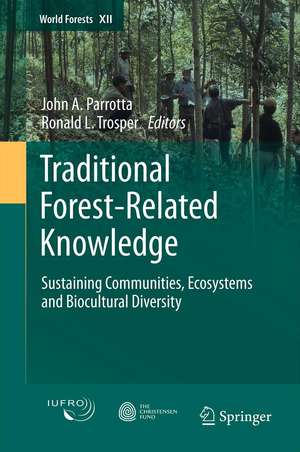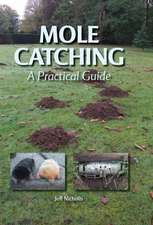Traditional Forest-Related Knowledge: Sustaining Communities, Ecosystems and Biocultural Diversity: World Forests, cartea 12
Editat de John A. Parrotta, Ronald L. Trosperen Limba Engleză Paperback – 29 noi 2013
The contents also highlight efforts to conserve and promote traditional forest management practices that balance the environmental, economic and social objectives of forest management. It places these efforts in the context of recent trends towards the devolution of forest management authority in many parts of the world.
The book includes regional chapters covering North America, South America, Africa, Europe, Asia and the Australia-Pacific region. As well as relating the general factors mentioned above to these specific areas, these chapters cover issues of special regional significance, such as the importance of traditional knowledge and practices for food security, economic development and cultural identity. Other chapters examine topics ranging from key policy issues to the significant programs of regional and international organisations, and from research ethics and best practices for scientific study of traditional knowledge to the adaptation of traditional forest knowledge to climate change and globalisation.
| Toate formatele și edițiile | Preț | Express |
|---|---|---|
| Paperback (1) | 1233.37 lei 43-57 zile | |
| SPRINGER NETHERLANDS – 29 noi 2013 | 1233.37 lei 43-57 zile | |
| Hardback (1) | 1237.80 lei 43-57 zile | |
| SPRINGER NETHERLANDS – 15 oct 2011 | 1237.80 lei 43-57 zile |
Din seria World Forests
- 15%
 Preț: 646.43 lei
Preț: 646.43 lei - 15%
 Preț: 643.48 lei
Preț: 643.48 lei - 18%
 Preț: 1235.43 lei
Preț: 1235.43 lei - 18%
 Preț: 1225.94 lei
Preț: 1225.94 lei - 15%
 Preț: 631.53 lei
Preț: 631.53 lei - 18%
 Preț: 947.35 lei
Preț: 947.35 lei - 18%
 Preț: 943.57 lei
Preț: 943.57 lei - 18%
 Preț: 946.41 lei
Preț: 946.41 lei - 18%
 Preț: 953.35 lei
Preț: 953.35 lei - 18%
 Preț: 1559.80 lei
Preț: 1559.80 lei - 15%
 Preț: 644.95 lei
Preț: 644.95 lei - 15%
 Preț: 640.06 lei
Preț: 640.06 lei - 15%
 Preț: 645.60 lei
Preț: 645.60 lei - 18%
 Preț: 1223.55 lei
Preț: 1223.55 lei - 18%
 Preț: 730.35 lei
Preț: 730.35 lei - 18%
 Preț: 1107.56 lei
Preț: 1107.56 lei - 18%
 Preț: 1240.30 lei
Preț: 1240.30 lei - 18%
 Preț: 952.40 lei
Preț: 952.40 lei - 20%
 Preț: 552.12 lei
Preț: 552.12 lei - 18%
 Preț: 954.45 lei
Preț: 954.45 lei - 24%
 Preț: 779.23 lei
Preț: 779.23 lei - 24%
 Preț: 1058.44 lei
Preț: 1058.44 lei - 18%
 Preț: 943.57 lei
Preț: 943.57 lei
Preț: 1233.37 lei
Preț vechi: 1504.11 lei
-18% Nou
Puncte Express: 1850
Preț estimativ în valută:
236.01€ • 247.03$ • 196.43£
236.01€ • 247.03$ • 196.43£
Carte tipărită la comandă
Livrare economică 31 martie-14 aprilie
Preluare comenzi: 021 569.72.76
Specificații
ISBN-13: 9789400737532
ISBN-10: 940073753X
Pagini: 648
Ilustrații: XXVI, 622 p.
Dimensiuni: 155 x 235 x 34 mm
Greutate: 0.89 kg
Ediția:2012
Editura: SPRINGER NETHERLANDS
Colecția Springer
Seria World Forests
Locul publicării:Dordrecht, Netherlands
ISBN-10: 940073753X
Pagini: 648
Ilustrații: XXVI, 622 p.
Dimensiuni: 155 x 235 x 34 mm
Greutate: 0.89 kg
Ediția:2012
Editura: SPRINGER NETHERLANDS
Colecția Springer
Seria World Forests
Locul publicării:Dordrecht, Netherlands
Public țintă
Professional/practitionerCuprins
Dedication.- Preface.- Acknowledgements.- 1. Introduction: The Growing Importance of Traditional Forest-Related Knowledge.- 2. Africa.- 3. Latin America—Argentina, Bolivia, and Chile.- 4. Amazonia.- 5. North America.- 6. Europe.- 7. Russia, Ukraine, the Caucasus, and Central Asia.- 8. Northeast Asia.- 9. South Asia.- 10. Southeast Asia.- 11. Western Pacific.- 12. Globalisation, Local Communities, and Traditional Forest-Related Knowledge.- 13. Traditional Forest-Related Knowledge and Climate Change.- 14. Ethics and Research Methodologies for the Study of Traditional Forest-Related Knowledge.- 15. The Unique Character of Traditional Forest-Related Knowledge: Threats and Challenges Ahead.- Subject Index.- Author Index.
Recenzii
From the reviews:
“Parrotta (US Forest Service) and Trosper (Univ. of British Columbia, Canada) have compiled and edited an interesting collection of papers that comprehensively review ‘traditional forest-related knowledge.’ … the book will have the most interest to upper-level undergraduates and beyond who have a focus on international forestry, traditional forestry practices, and issues of human/environmental interactions. Summing Up: Recommended. Upper-division undergraduates, graduate students, researchers/faculty, and professionals.” (J. L. Rhoades, Choice, Vol. 49 (10), June, 2012)
“Traditional Forest-Related-Knowledge … is an encyclopedic treatment of the topic with something for everyone. … the elements through which they are compared are carefully chosen to reveal the core of TFRK. This is an enlightening treatment of the topic. The chapter on ethics is similarly thoughtful and enlightening. … This chapter should be read by anyone doing research with indigenous people, or, for that matter, any field researcher at all.” (Louise Fortmann, International Journal of the Commons, Vol. 6 (2), August, 2012)
“Parrotta (US Forest Service) and Trosper (Univ. of British Columbia, Canada) have compiled and edited an interesting collection of papers that comprehensively review ‘traditional forest-related knowledge.’ … the book will have the most interest to upper-level undergraduates and beyond who have a focus on international forestry, traditional forestry practices, and issues of human/environmental interactions. Summing Up: Recommended. Upper-division undergraduates, graduate students, researchers/faculty, and professionals.” (J. L. Rhoades, Choice, Vol. 49 (10), June, 2012)
“Traditional Forest-Related-Knowledge … is an encyclopedic treatment of the topic with something for everyone. … the elements through which they are compared are carefully chosen to reveal the core of TFRK. This is an enlightening treatment of the topic. The chapter on ethics is similarly thoughtful and enlightening. … This chapter should be read by anyone doing research with indigenous people, or, for that matter, any field researcher at all.” (Louise Fortmann, International Journal of the Commons, Vol. 6 (2), August, 2012)
Textul de pe ultima copertă
Exploring a topic of vital and ongoing importance, Traditional Forest Knowledge examines the history, current status and trends in the development and application of traditional forest knowledge by local and indigenous communities worldwide. It considers the interplay between traditional beliefs and practices and formal forest science and interrogates the often uneasy relationship between these different knowledge systems.
The contents also highlight efforts to conserve and promote traditional forest management practices that balance the environmental, economic and social objectives of forest management. It places these efforts in the context of recent trends towards the devolution of forest management authority in many parts of the world.
The book includes regional chapters covering North America, South America, Africa, Europe, Asia and the Australia-Pacific region. As well as relating the general factors mentioned above to these specific areas, these chapters cover issues of special regional significance, such as the importance of traditional knowledge and practices for food security, economic development and cultural identity. Other chapters examine topics ranging from key policy issues to the significant programs of regional and international organisations, and from research ethics and best practices for scientific study of traditional knowledge to the adaptation of traditional forest knowledge to climate change and globalisation.
"Forestry, the oldest of the resource management sciences, has been coming under pressure in recent years to incorporate multiple values. Traditional Forest-Related Knowledge is remarkable for its comprehensive coverage of world regions and 'hot' topics such as globalization, climate change and research ethics. It is a unique book, marking a breakthrough with its authoritative treatment of alternative sources of knowledge and multiple perspectives, and contributing to a paradigm changein forest management."
- Fikret Berkes, Distinguished Professor and Canada Research Chair at the University of Manitoba, and author of Sacred Ecology
The contents also highlight efforts to conserve and promote traditional forest management practices that balance the environmental, economic and social objectives of forest management. It places these efforts in the context of recent trends towards the devolution of forest management authority in many parts of the world.
The book includes regional chapters covering North America, South America, Africa, Europe, Asia and the Australia-Pacific region. As well as relating the general factors mentioned above to these specific areas, these chapters cover issues of special regional significance, such as the importance of traditional knowledge and practices for food security, economic development and cultural identity. Other chapters examine topics ranging from key policy issues to the significant programs of regional and international organisations, and from research ethics and best practices for scientific study of traditional knowledge to the adaptation of traditional forest knowledge to climate change and globalisation.
"Forestry, the oldest of the resource management sciences, has been coming under pressure in recent years to incorporate multiple values. Traditional Forest-Related Knowledge is remarkable for its comprehensive coverage of world regions and 'hot' topics such as globalization, climate change and research ethics. It is a unique book, marking a breakthrough with its authoritative treatment of alternative sources of knowledge and multiple perspectives, and contributing to a paradigm changein forest management."
- Fikret Berkes, Distinguished Professor and Canada Research Chair at the University of Manitoba, and author of Sacred Ecology
Caracteristici
Provides an up-to-date summary of the emerging field of traditional forest management Includes global coverage of traditional forest management Offers a highly relevant interdisciplinary approach to tackling current issues in natural resource management and policy















